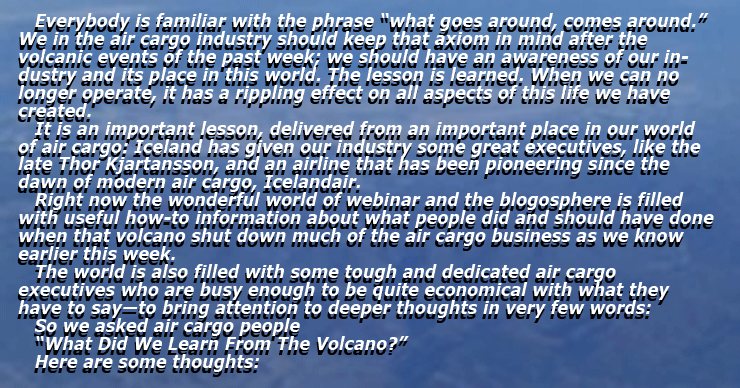
“We were never grounded although
believe it or not (Friday April 23) Reykjavik had been closed temporarily
so we moved operations to the other side of the island.
“Icelandair operates five B757 freighters
that have remained in operation into Europe and North America throughout
the emergency.
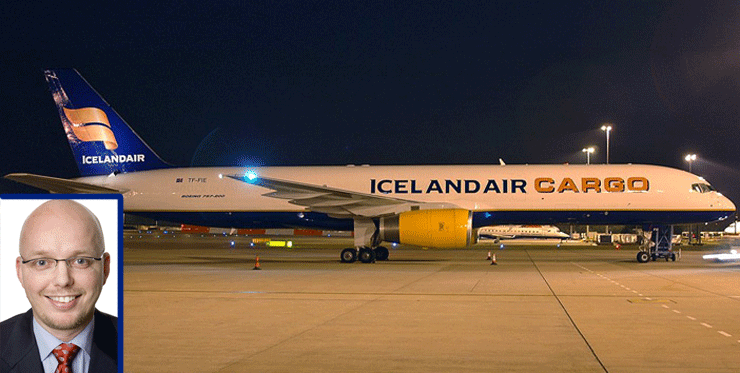
“Living here we are used to volcanic
activity but of course nothing equal to the magnitude of the recent
eruptions.
“Many Icelanders feel that the incident
was unique and maybe even a once-in-a-lifetime.
“But many of us are also quite annoyed
at the interruption of our services, joining everyone in Europe and
around the world in that feeling.
“If there is a bright side, long
term maybe more people will realize the importance of air cargo as critical
in the vital international flow of commerce.
“Thing about Iceland, the world
certainly now knows more of our island nation than before.
“I came to this business two years
ago from the passenger side and must admit that at first I didn’t
get it about air cargo.
“But now am constantly amazed at
the challenge and excitement and also the constant evolution going on
in the air cargo industry.
“Certainly the performance of our
staff and in fact everyone from the ground up at Icelandair is great
testimony to our resilience and inventiveness gained during 70 years
of service.”
Gunnar Mar Sigurfinnsson
Managing Director
Icelandair Cargo
 "The
volcanic ash cloud has again proven how vulnerable our global economy
is. "The
volcanic ash cloud has again proven how vulnerable our global economy
is.
“This is particularly true for the
airline business.
“IATA forecast a financial damage
of 1.7 billion USD—this hits our industry at a time of slow recovery.
“An act of god like this volcanic
eruption is of course out of control for any leader in politics or business.
“But we have to ensure that the
reactions are appropriate.
“The closure of air space was taken
differently in each European country, making planning for the airlines
almost impossible.
“It also took days to get an aircraft
in the air that could provide reliable information about the concentration
of the ash in the air.
“In order to be better prepared
in the future we need to analyze these steps thoroughly and put the
necessary protocols in place.
“At Lufthansa Cargo the situation
is now slowly recovering.
“Our top priority is to get back
to normal operations as soon as possible.
“During this state of emergency
brought on by the volcanic eruption, dialogue with our customers was
extremely important.
“We had to show that we were doing
our utmost to get their freight to the booked destination as quickly
as possible.
“The crisis has shown how much certain
industries depend on regular air transport. It also became clear how
much value air cargo generates for global trade and global production.
“At this point, I must express my
most sincere thanks to all our colleagues at Lufthansa Cargo.
“Not only has the crisis team been
meeting round-the-clock for a week now—the sheer dedication of
staff at sales offices and at the stations around the globe has also
been exemplary."
Dr. Andreas Otto
Executive Board
Product and Sales
Lufthansa Cargo
 |
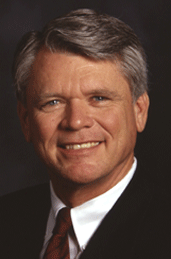 |
"One
of the cornerstones of Continental is 'Working Together', a principle
which encourages departments to collaborate.
“Never was that value exemplified
more than during the Volcanic Ash disruptions.
“Regular conference calls,
every few hours, helped cargo quickly identify opportunities to
move London shipments via Glasgow or Amsterdam shipments via Stockholm.
“As a result, we have already
cleared backlogs in Houston and Newark and are looking for business."
Jim McKeon
Vice President Cargo
Continental Airlines |
 |
 “I
guess Mother Nature has underscored the worldwide financial meltdown
(pun intended) in that the logistics pipeline cannot be overly
reliant on one mode of (premium) transport. “I
guess Mother Nature has underscored the worldwide financial meltdown
(pun intended) in that the logistics pipeline cannot be overly
reliant on one mode of (premium) transport.
“All of those freighters parked
in the desert, ordered when consumption and expansion offered
infinite possibilities.
“In some small way, we can
only hope that this current disruption may prompt some in the
manufacturing arena to bring their manufacturing back to their
home markets (which this economy sorely needs)."
Peter Appleton
CEO
Airline Cargo Services
|
 |
 Honestly
the volcano issue has not had a major impact on our Lat/Am business
other than some feeder operations into our network were low on
incoming volumes. Honestly
the volcano issue has not had a major impact on our Lat/Am business
other than some feeder operations into our network were low on
incoming volumes.
 Other than that it has been business as usual!
Other than that it has been business as usual!
Ulf Jantzen
Commercial Director
International Americas
DHL Express
|

 “We
received another reminder as to the levels to which mother nature
and human risk perceptions combine to exacerbate the fragility
of our complex interconnected world. “We
received another reminder as to the levels to which mother nature
and human risk perceptions combine to exacerbate the fragility
of our complex interconnected world.
“The extent to which our decisions
compound nature's impact appear limitless.
“Maintaining a clarity of
purpose, significantly aids our ability to adapt in such crises.
“Timing those critical decisions
whilst applying sensible risk mitigation is where success can
be snatched from jaws of defeat.
“Going forward, a thorough
and transparent analysis as to the decisions made by ALL the stakeholders
involved in the European Air Transport industry must be performed.
“Our industry is all about
managed risk. “Our success in risk management is made through
applying as wide a set of experience as possible.
James Fernandez
Vice President, Sales and Marketing
CHAMP Cargosystems
|
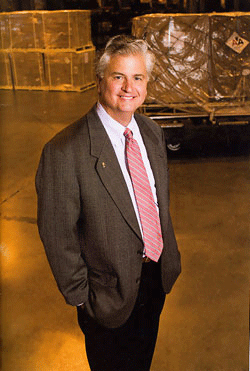
|
“I think we've learned to
be more religious.
“After all, it must have been
Moses going to the volcano and parting the ash that opened up
the skies again for humanity.”
Dave Brooks
President
American Airlines Cargo |
 “We
had some hard days over here—but now the worst seems to
be over. “We
had some hard days over here—but now the worst seems to
be over.
“We have worked literally
day and night to cover all the media enquiries.
“Looking for a positive
side of this volcano: air cargo has gained a lot of attention.
“People now finally
know how air cargo is securing production chains - and that a
disruption of the supply chain leads to severe problems for the
manufacturing industry.
“We feel a lot of understanding
from the public now—and hope that a better sense of just
how vital air cargo is to everybody will now take hold and impact
our fight against a night-ban at Frankfurt Main, the world’s
seventh biggest cargo airport.
Nils Haupt
Director Communications
Lufthansa Cargo
|
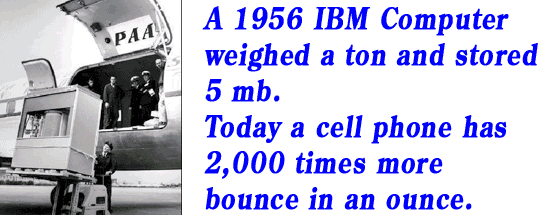
 “If
political response to an unknown situation is to force an entire
mode of transport to stop (regardless whether air, ocean, rail
or road), our globalized labor-division will be impacted heavily
and could cause entire production lines to collapse (e.g. BMW,
Nokia, etc.) “If
political response to an unknown situation is to force an entire
mode of transport to stop (regardless whether air, ocean, rail
or road), our globalized labor-division will be impacted heavily
and could cause entire production lines to collapse (e.g. BMW,
Nokia, etc.)
“The new challenge for
logistics providers and airline network planners is to re-develop
contingency plans for their clients: e.g. If a regional area such
as Western Europe is excluded from air transport, how can you
make sure to reach the next available open air space such as Latvia,
Hungary, etc.?
“In any case that would
certainly involve more costs and who’ll be willing to pay
for them?
“The (over) reaction
of the German ministry for traffic reminds me of a similar situation
on the swine flu: “Someone predicts something and politicians
overreact.
“So, there is a need
for an Action Team which must include Safety officers from airlines,
airports and air traffic control. “Include those specialists
into the final judgement about closing down transportation
“Inclusion is the only
way for all stakeholders to take responsibility in full for this
kind of action.
“We must never forget
that there is competition.
“Avoid distortion of
competition and be clear on subsidies or other forms of financial
compensation.
Dirk Steiger
CEO
Aviainform Consulting GmbH
Frankfurt Germany
|
 |
 |
“Air Cargo should be more
volcanic minus the side effects of some hothead on a remote island
in the North Atlantic.”
Oliver Evans
Chief Cargo Officer
SWISS WorldCargo
|
 “My
feeling is that the Volcano eruption clearly demonstrates how
difficult it is to make money in the aviation industry. “My
feeling is that the Volcano eruption clearly demonstrates how
difficult it is to make money in the aviation industry.
“Despite the most advanced
controlling mechanisms, Mother Nature throws us a curveball which
could have easily meant the end for some carrier, if grounding
would have continued.
“Aside from meteorological
conditions, our industry seems to always suffer from any hiccup
anywhere on the planet.
“Since my time with
LTU, Air Berlin and Leisure Cargo we have been confronted with
the first Gulf War, SARS, Bird Flu, September 11th, second Gulf
War, Swine Flu, political problems in Thailand, Civil War in Sri
Lanka and numerous hurricanes bringing turmoil to tourism in the
Caribbean area—just to name a few instances which have stuck
in memory.
“I tell my children
to stay away from this business we are in . . . and learn something
different to do for a living.
Ralf Auslaender
Managing Director
leisure Cargo
|
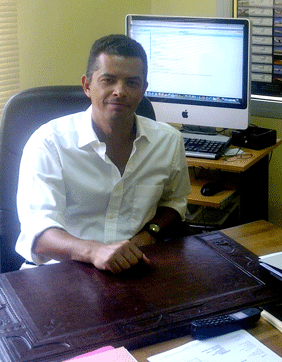 "This
situation had an important impact on our activities and we are
pleased that EU is open again. "This
situation had an important impact on our activities and we are
pleased that EU is open again.
“We agree that decisions
had to be taken by the EU civil aviation and that aircraft security
needs to be our main concern.
“The Africa West Cargo
team worked hard to get things back to normal which is where we
are as of April 23, 2010.
“We note our Asian route
via Dubai experienced major increases and many customers are now
utilizing our DXB option, open since 2007.
“In 2009 we changed
our aircraft type, based in Lomé (Togo) to a DC9F, that
has really adapted to our hub needs, coupled with the B747F.
"Both aircraft are used
for charters.
“For sure, 2010, will
be a good year for our company.”
Didier Sahraoui
Cargo Sales and Interline Manager
Africa West
|
|

